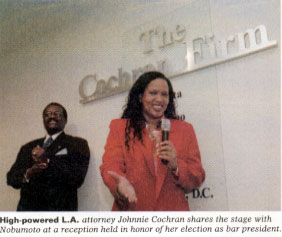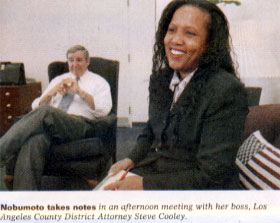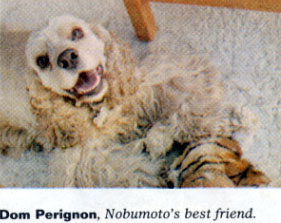|
 appears to be filibustering, reading from the
trial transcript for much of the afternoon. And this is a bench trial,
so there is no audience, no jury to impress with sweeping gestures and
colorful language. Frankly, it's a little boring - even the judge
makes a wry comment or two. appears to be filibustering, reading from the
trial transcript for much of the afternoon. And this is a bench trial,
so there is no audience, no jury to impress with sweeping gestures and
colorful language. Frankly, it's a little boring - even the judge
makes a wry comment or two.
Although she's slouching at the attorneys'
long table, and if one is vigilant, she can be caught - once or
twice - rolling her eyes at the defense's monotone monologue,
Nobumoto's own argument is all business. Animated and concise, she
summarizes testimony given by alleged victims. Then she breaks for
lunch in the criminal court's cafeteria.
"It's nothing like a jury trial; in the end,
passion doesn't win the day with the judge," she said.
Later in the week, Hylland was found guilty of 27
charges and sentenced to a 13-year prison term. But because practicing
law without ever having had a license is a misdemeanor, most of the
prison time comes from convictions of felony grand theft.
It bothers Nobumoto that shysters so often prey
on recent immigrants and the poor - she is committed to diversity
and plans to make minority and disability issues the hallmark of her
presidency.
And
it frustrates her that UPL is difficult to prosecute under current
state laws.
"We as a bar need to lobby Sacramento, make
this a felony. We need to look at prosecution, not just prevention,"
she said.
Had there been a jury in this court, Nobumoto
would have talked at length about the real harm of UPL: the house lost
by one woman forced to declare bankruptcy after dealing with Hylland;
the visitation rights that were damaged by Hylland's failure to
appear. This is the harm that cannot be assuaged by a few thousand
dollars in restitution.
"Much of this harm is not economic; it's the
havoc done to these people's families," Nobumoto said.
 In less than a half-hour, three defense attorneys
have approached the cafeteria table, appearing in succession as if
swept in Nobumoto's direction. "You know what makes her a great
prosecutor?" said Andy Stein, a criminal defender who took a seat
opposite the prosecutor and stayed to chat awhile. "She's more
interested in doing the right thing than winning." In less than a half-hour, three defense attorneys
have approached the cafeteria table, appearing in succession as if
swept in Nobumoto's direction. "You know what makes her a great
prosecutor?" said Andy Stein, a criminal defender who took a seat
opposite the prosecutor and stayed to chat awhile. "She's more
interested in doing the right thing than winning."
That's not to say she tends to lose her cases:
Of 20 felony trials she prosecuted for the county's central trials
division, 18 resulted in guilty verdicts, two in plea bargains.
Stein, a private practitioner from Bellflower,
has opposed Nobumoto in a handful of felony trials, and, he estimates,
as many as 50 court appearances.
"I like having someone like her on the other
side. She's not easy. She's not soft. She's hard-nosed and
tough, but fair," Stein said. "If you're not prepared, you're
going to get hammered by her. She'll take your head off in the
courtroom."
Little gets in the way of Nobumoto, 49, when it
comes to doing what she believes is the right thing. Not even the
sight of blood.
She recalled an incident early in her career in
which she badly sliced her finger on a defective chair, in the middle
of a preliminary hearing. Bleeding profusely and in terrible pain, she
wrapped her finger in napkins and continued arguing as if nothing had
happened.
"Finally, the judge leans over and says, 'Ms.
Nobumoto, do we have a problem?' I said, 'Yes sir, your honor.'
I remember I was too afraid to stop because of (the defendant's)
right to a continuous preliminary hearing."
 During her term as the State Bar's first woman
minority president, Nobumoto will be working in the D.A.'s employee
relations division, where she can take on fewer cases and steer clear
of long days in court. But she's already thinking about where
she'll land when her year is up. During her term as the State Bar's first woman
minority president, Nobumoto will be working in the D.A.'s employee
relations division, where she can take on fewer cases and steer clear
of long days in court. But she's already thinking about where
she'll land when her year is up.
Right now, she's thinking arson.
"The science aspect is appealing to me; the
evidence these investigators find tells the whole story - it's
really amazing," Nobumoto said. "(And) they're such horrific
crimes - not only were these people killed, but they suffered to
death."
Then again, she muses, she also is interested in
fraud, in helping to knock people like Hylland, the unlicensed
practitioner, out of commission.
Whatever she sets her sights on, her record
virtually seals her success. In addition to an alphabet soup of
professional affiliations, Nobumoto's 12-year career has included a
promotion to the county's elite career criminals unit and
recognition as 1998 Prosecutor of the Year by the Century City Bar
Association.
"She's one of our best; we're proud of all
her accomplishments and we're happy to have her here in any
capacity," District Attorney Steve Cooley said. "But believe it or
not," he added, "we do have a few other able attorneys who can
fill in for her" during her presidency.
Nobumoto's downtown office is pretty much
wall-to-wall boxes as she prepares to move into the new position,
which happens to include a slightly plusher office in another
building.
 "Just that seems like withdrawal. I should be
happy, right?" Nobumoto said. "(But) I'd rather be in total
squalor, doing the real stuff." "Just that seems like withdrawal. I should be
happy, right?" Nobumoto said. "(But) I'd rather be in total
squalor, doing the real stuff."
Stein said that early on, other attorneys could
tell Nobumoto would be a great prosecutor by the compassion she showed
for victims and in some cases, for defendants with sympathetic
circumstances. She didn't showboat, he said, and she didn't always
throw the book at defendants - especially those accused of crimes
related to poverty - as some zealous young lawyers might.
"She's a good lawyer, but she's a better
human being and that's what it's all about," Stein said.
"Everyone knew right away Karen was going to be a good D.A. because
she's real, she has real-life experience."
Born in Cleveland and raised in Los Angeles,
Nobumoto received her J.D. in 1989 from Southwestern University School
of Law. Her mother was a schoolteacher; her father, a social worker.
"Government service is in our blood; I was
raised in a community-service environment," Nobumoto said.
Nobumoto's family is also filled with artists:
her 38-year-old sister, Lisa, is a jazz musician; the family also is
related to noted jazz musician Charles Lloyd. A Dallas cousin is a
painter, and Nobumoto's home is dotted with the woman's
African-American themed oils and pastels.
Active in the bar since she was admitted at the
end of 1989, Nobumoto was elected to the board of governors just in
time to help rebuild the bar following its dismantling in 1998. In
winning the presidency, she beat out all four members of the
third-year class.
She is being sworn in this month at the State
Bar's Annual Meeting in Anaheim, but for the last six months she has
traveled extensively in preparation for her post.
It's difficult to believe law is the
tough-talking attorney's third career, following stints as a
marketing representative for IBM, and - even harder to imagine - a
preschool teacher.
But at her hilltop home near Pasadena, Nobumoto
produces a scrapbook filled with sponge paintings, crayon scrawls and
rudimentary lettering. She still remembers all her former students,
though the kids are now teen-agers: Who was better with fingerpaint;
who had trouble forming the letter "c"; who was a troublemaker;
who was particularly precocious.
"I had 3-year-olds. When I walked in the door
in the morning, I was surrounded by hugs," Nobumoto said. "You
walk in and get nothing but love - pretty cool job."
When you walk into Nobumoto's contemporary,
two-bedroom house, you get Kiki, a skink with a prehensile tail. Kiki,
12, has a large cage to herself in the light-filled foyer, where the
reptile lazily greets guests. She's alone because she refused the
company of her male counterpart, Blue, named for the color of his
tongue. Blue was granted asylum in the kitchen.
The reptiles have been with Nobumoto throughout
her legal career, replacing an iguana who died. Both skinks together
are much smaller, and according to Nobumoto, are each easily twice as
intelligent as their predecessor.
Bar junkies still talk about the time Nobumoto
appeared at a bar commission meeting in the early 1990s with Kiki
peeking from her long, dark mane.
"(But) I've reformed," she insisted.
"That's a lesson for the ambitious young lawyer - whatever you
do at the bar, they'll still be talking about it 12 years down the
line."
 Kiki and Blue are firmly entrenched among the
black-laquered, Asian-influenced furnishings in Nobumoto's home, but
they share the space with the rest of her small zoo: Banana Boat the
box turtle lives in the bedroom; Rasta the chinchilla occupies the
television room; Yin and Yang, a pair of green parakeets, separate the
living and dining rooms; and Dom Perignon, the cocker spaniel, pretty
much has the run of the place. Kiki and Blue are firmly entrenched among the
black-laquered, Asian-influenced furnishings in Nobumoto's home, but
they share the space with the rest of her small zoo: Banana Boat the
box turtle lives in the bedroom; Rasta the chinchilla occupies the
television room; Yin and Yang, a pair of green parakeets, separate the
living and dining rooms; and Dom Perignon, the cocker spaniel, pretty
much has the run of the place.
As she travels the courthouse halls, Nobumoto
seems to collect people - they just gravitate her way as she speeds
from one floor to another, from Cooley's expansive office to the
spartan cafeteria to the courtroom. It's impossible to slow her
momentum, but she manages at least a chirpy greeting - even if
it's only a partial sentence - "Hey, how're . . . great!"
- tossed in the direction of colleagues, friends and admirers.
At home, she collects things. There are the pets
representing land, sea and air, of course, as well as 300-plus bottles
of wine in the cellar, more than 1,000 VHS tapes and dolls from around
the world.
The dolls represent different points of travel,
serving to remind Nobumoto that there was a time she took pleasure
trips, not just the business variety.
A major movie buff, her shelves contain examples
of nearly every genre from the 1970s to the present, especially
comedies: In the "A" section, it's "Action Jackson" to
"Austin Powers." Her all-time favorite movie, though, is "Gone
with the Wind."
Although
Nobumoto enjoys sharing her many wines and champagnes with guests, she
cannot bring herself to crack open any of her 1990 bottles of Cristal
or Dom Perignon.
"I didn't even crack one when I was announced
bar president," she said. "I don't know what occasion's going
to be special enough." |

